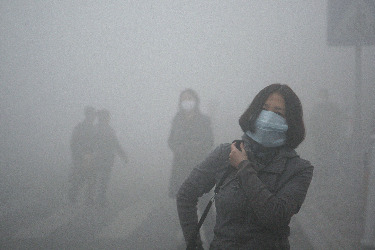China illustrates the true meaning of Direct Action on climate

By Dr Anthony Horton
With 37 days to go until the Paris Climate Change conference in December, a report released by the Paulson Institute in Beijing on Friday October 23 outlined a plan to accelerate the economic and environmental improvement transition in the Beijing-Tianjin-Hebei region in China, which last year was home to 130 million people and accounted for 10% of China’s GDP.
In addition to industrial areas, modern urban centres and districts trying to resist urban sprawl and maintain their rural character, the region is also called home by the largest steel and iron manufacturers in China, and some of the most polluted cities in the world. The steel, coke and cement industries are the largest greenhouse gas emitters in China.
According to a story in the weekend edition of the China Daily newspaper (24/25 October) which discussed the highlights of the report, the region is well placed to transition on the basis of its good infrastructure and relatively easy access to wind and solar power.
Former US Treasury Secretary Henry Paulson stated in an interview on the release of the report that in his opinion the next Five Year Plan (commencing in 2016) will be very ambitious and widely acclaimed. Figuring out how to make the Plan a reality will represent the biggest challenge though, and transitioning from “dirty” to “clean” plants without stifling growth was achievable but will take some time. Paulson also highlighted the huge opportunities that such a transition presents for international companies based on the size of the market for environmental goods and services.
Deputy Director of the Beijing Municipal Commission of Development and Reform, Wang Jiahui commented that it was possible to control air pollution, given the emissions reduction campaign conducted during APEC China last year. She also stated that nineteen coal fired power plants in Tianjin will meet the emission standards that gas fired stations are required to meet by the end of this year.
Liu Bozheng, also a Deputy Director of the Beijing Municipal Commission of Development and Reform announced that 1200 high energy consumption and highly polluting companies will be closed by 2017 rather than relocated to other regions. Four significant thermoelectric centres have been closed in Beijing and numerous coal fired boilers have been converted to gas boilers. A number of energy efficiency measures have also been implemented in Beijing as part of revamping more than 40 million square metres of office space.
Rather than simply revitalising industries in decline, the report recommended that City officers should identify opportunities for new growth industries. With respect to Hebei, officers should prioritise policies that promote renewable energy, energy efficiency and have strong growth and job creation potential, according to the Paulson Institute report.
I read the China Daily story on the flight from Beijing to Perth on Sunday, and have to admit that it brought to mind many of the conversations I had over the week I was in China. I was invited to speak on the role of innovation in the environmental protection space at the China Mining Conference and Exhibition 2015 in Tianjin, and in addition to speaking to a range of people in my session, I also spoke to many others over the three days of the conference.
After reflecting on the conference and the few days I spent in Beijing before and after, I left China with four main impressions. Firstly, there is an appreciation of the scale of transition that is required. There is also an understanding that the Green Mining Standard (initially conceived by the Ministry of Land and Resources in 2007) and the Guidance to Implement the National Mineral Resource Program, Develop Green Mining and Construct a Green Mine issued in 2010 (which essentially established a defined Green Mining Standard) is flexible enough to accommodate new knowledge and innovative approaches.
The Green Mining Standard takes into account nine operational aspects-operating legally, good practices, the efficient use of resources, technological innovation, limiting releases of wastes, environmental protection, reclamation, a harmonious relationship with the community and a good culture within the company.
Third, there is a willingness to listen to adopt learnings from international mining settings, and lastly (but by no means least), there is an optimism regarding what can be achieved in the short, medium and long term.
I am also heartened by the singularity of the messages I heard from Governments and Mining companies in China with respect to the need to protect the environments in which mining takes place as well as nearby ecosystems (which are linked in some way to those mined areas) as far as practicable and the importance of clear legislation and policies which facilitate that protection.
 About the author: Anthony Horton holds a PhD in Environmental Science, a Bachelor of Environmental Science with Honours and a Diploma of Carbon Management. He has a track record of delivering customised solutions in Academia, Government, the Mining Industry and Consulting based on the latest wisdom and his scientific background and experience in Climate/Atmospheric Science and Air Quality. Anthony’s work has been published in internationally recognised scientific journals and presented at international and national conferences, and he is currently on the Editorial Board of the Journal Nature Environment and Pollution Technology. Anthony also blogs on his own site, The Climate Change Guy.
About the author: Anthony Horton holds a PhD in Environmental Science, a Bachelor of Environmental Science with Honours and a Diploma of Carbon Management. He has a track record of delivering customised solutions in Academia, Government, the Mining Industry and Consulting based on the latest wisdom and his scientific background and experience in Climate/Atmospheric Science and Air Quality. Anthony’s work has been published in internationally recognised scientific journals and presented at international and national conferences, and he is currently on the Editorial Board of the Journal Nature Environment and Pollution Technology. Anthony also blogs on his own site, The Climate Change Guy.
Like what we do at The AIMN?
You’ll like it even more knowing that your donation will help us to keep up the good fight.
Chuck in a few bucks and see just how far it goes!
Your contribution to help with the running costs of this site will be gratefully accepted.
You can donate through PayPal or credit card via the button below, or donate via bank transfer: BSB: 062500; A/c no: 10495969










7 comments
Login here Register here-
guest -
Michael Taylor -
brickbob -
metadatalata -
Florence nee Fedup -
guest -
Florence nee Fedup
Return to home page“…it bought to mind…”
It is an error (“typo”) which is far too common.
And what about the rest of the article? Anything to say on that?
Thank you Anthony for a great well informed article on the effort in China,and yes i will state the obvious,it reallydoes make our effort look pathetic.””
Yep, we are in really deep shit here. We have a government that has facilitated the building and sale of the most polluting industries in Australia to offshore interests and the average voter has no means of holding either the government or miners to account for the cost of cleaning up after them.
We have a government that has killed off investment in renewable energy and supporting industries and is currently promoting both coal and nuclear energy: the two worst possible energy sources when we have the country that has the absolute best conditions possible for solar and wind energy production.
Nobody I know agrees with the decisions the government and opposition parties are making on our behalf in regard to future energy sources or environmental care. It is obvious that government and opposition party today in Australia does not represent the wishes of most of its people and is not doing anything for the long-term benefit of the planet either. So what are they doing there while pigging out on the taxpayers behalf?
Did it change meaning or contents?
I know it looks pedantic to point out errors of spelling or grammar, but I do expect some editing to occur to check these matters. Of course typos will occur. There are people who make judgements according to errors made. It is not just a matter of whether we understand or not.
I remember when people made the claim that teachers were not teaching spelling and grammar. It was a misunderstanding about what teachers were doing.
Now the claim seems to be that spelling does not matter, as long as we understand what is meant. My belief is that it is never too late to learn. Eventually someone will tell someone about their spelling and they will say, Well, no one ever told me before!
Having said all that, I am not going to stop people in full flight to point out errors. But in a more formal written situation, I expect accuracy.
The problem is that too often we see errors in writing, especially in the comments. Very often these errors occur among writers who clearly can write well, but make surprising errors.
We see such things as ‘would of…’, or ‘bigger then’, ‘who’s’ when they mean ‘whose’ (by the way, ‘whom’ seems to have disappeared).
We see confusion about ‘effect’ and ‘affect’, ‘there’, their’ and ‘they’re’. Still we have problems with apostrophes. Yes, the English language is not easy.
My pet complaint at the moment is the fact that many people have no problem with commas, full stops, even semi-colons… But the punctuation of addressing someone in writing escapes them. Why is that? We see things such as ‘Your right Wayne.’ Or ‘You have made a good point Wayne and I agree with you.’ It becomes some kind of telegrammese. It can be a bit silly, as in ‘Have you finished eating Mother?’
Perhaps these errors will always be made, but there are those who talk about falling standards. Of course, it is possible to write perfectly grammatically and yet write utter rubbish, as we see daily in the MSM.
I prefer to read the independent media, such as AIMN. I find Anthony Horton’s work informative and authoritative. I do not point out a spelling error to be abusively critical, but to tidy up the “typo”. I am pleased that the “typo” has been corrected, but I am surprised to find you have kept my well-intended comment online.
Guest, your comment tells us more about you than this site.
it may have escaped your noticed, but this site cost you nothing,
I fail to see what your gripe is
Reading here is not compulsory
Would have been nice to see you address the post Some comments on the contents.